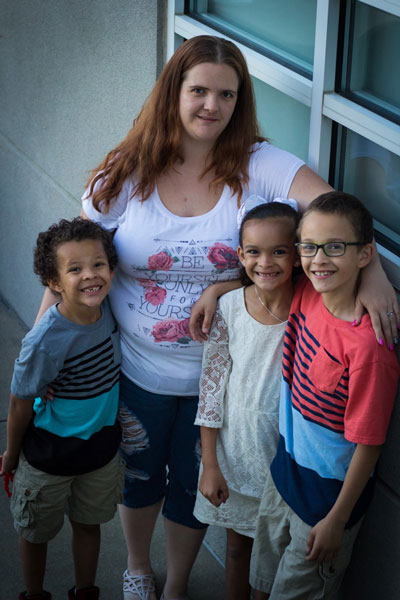There remains a face of foster care whose journey goes untold – the parents. Tiffany Graham is one of these faces. Her story is one of strength, determination, and a deep love for her children.
“Tiffany has fought hard to get where she is,” explains social worker, Julie Holmes.
Tiffany’s battle started in her early years. Her childhood held many obstacles and difficult situations. By the age of nineteen, she lived life on her own. By twenty-four, she was a single parent to three small children. When her youngest was just seven months old, authorities placed Tiffany’s children in foster care.
Tiffany did not have the issues many face. She did not have a drug or alcohol addiction. She always had employment. However, Tiffany’s up bringing created obstacles for her as a parent, but she determined to push past the difficulties in order for reunification to occur and for her children to have a better life.
She did not have much of a support system and many said I told you so instead of encouraging her in the darkest days. What she accomplished during this season of her life was in part due to her own determination and strength.
The precious gifts taken from her served as the motivation to push on. Tiffany explains, “My children are my encouragement. They are the reason I do the things I do.”
Many of the workers within the local CHFS office pushed her and did not let her give up or get down on herself. They became the support system she needed most. The relationships Tiffany built with the case workers remain strong even now.
“She is probably the most determined parent I ever worked with. She fought as hard as she could to get her children back. She always, always did what was best for them. Tiffany did everything we asked. When we asked for more, she’d do it,” Julie recalls.
One of Tiffany’s goals was to provide adequate housing. Julie recalls seeing the home Tiffany acquired for the first time, “It was the teeny, tiniest trailer, but it could have been a mansion because that’s where Momma was at. The kids were excited and so proud to show me their rooms. Kids don’t care what the house looks like. They want to be with family, whoever and wherever that may be. That was an eye-opener for me. They loved their mother and it didn’t matter where she was at, they wanted to be there.”
Tiffany’s determination reminded Julie and the other workers that a person can be a great parent and not have much money. Her biggest hurdle was limited income, but that did not stop her from pushing herself and advocating for her children. She did not always own a car, but made no excuses and utilized public transportation. She did not have the biggest or best house, but certainly made what she could provide a home for her three children. When one job didn’t pay the bills, she worked multiple.
After a year and a half, Tiffany met the goals set before her. Social workers recommended full reunification. However, circumstances out of their control kept the court proceedings active for another year.
The court proceedings in foster care cases are scary for families. Sometimes it goes the families’ way and sometimes it doesn’t. Sometimes parents are praised and sometimes not. At the end of the day, the biological families are the ones in the court room who have the very most to lose or most to gain in being allowed to reunite with their children or not.
“A lot of times people think adoption is a success story and it is. It definitely is a success story, but a reunification is what we strive for. Our focus is to keep the family together and reunite the children with the their parents safely,” explains Julie.
Foster care is meant to serve as a temporary situation in order to provide families the resources needed to ensure a safe living environment for children. The first placement goal in foster care is reunification between children and their family. When the foster and biological parents work together, there is a parenting partnership that creates a better situation for the children.
“If we have a foster family that supports the birth family, encourages them, and works with us, if the children can go home, they will go home and quicker. Foster parents are vital to this and when we can get the connection with the foster parents and the biological family, it is so much better.”
The children in this case experienced a partnership between the two worlds. The foster parent kept Tiffany informed and allowed her to be involved in the children’s lives. Tiffany found it hard not to compare herself to the foster mother. The foster parent provided opportunities and a lifestyle she could not due to her financial situation. However, she embraces that the foster mother loved and provided care for the children for a significant time. She continues to support the relationship between the foster parent and children after the reunification occurred. Julie explains, “To have just cut the connection off immediately would have been harmful for the kids. Tiffany did what was best for her kids, not what was best for her and not what was easy for her to do.”
Foster families are vital to the success of the foster program. They serve as a safe place while the biological families are able to focus on the goals set before them. Julie knows the bonds that form between the foster families and the children are strong, but she also cautions, “Sometimes we lose sight of the connection the birth families have with their children. Your heart tugs for the foster parent because they have loved the children and cared for them, but we have to stay focused on the family and getting them back together safely.”
The reunification process is not easy, but the love of a parent is powerful. Tiffany encourages, “Never give up. Keep pushing.”








